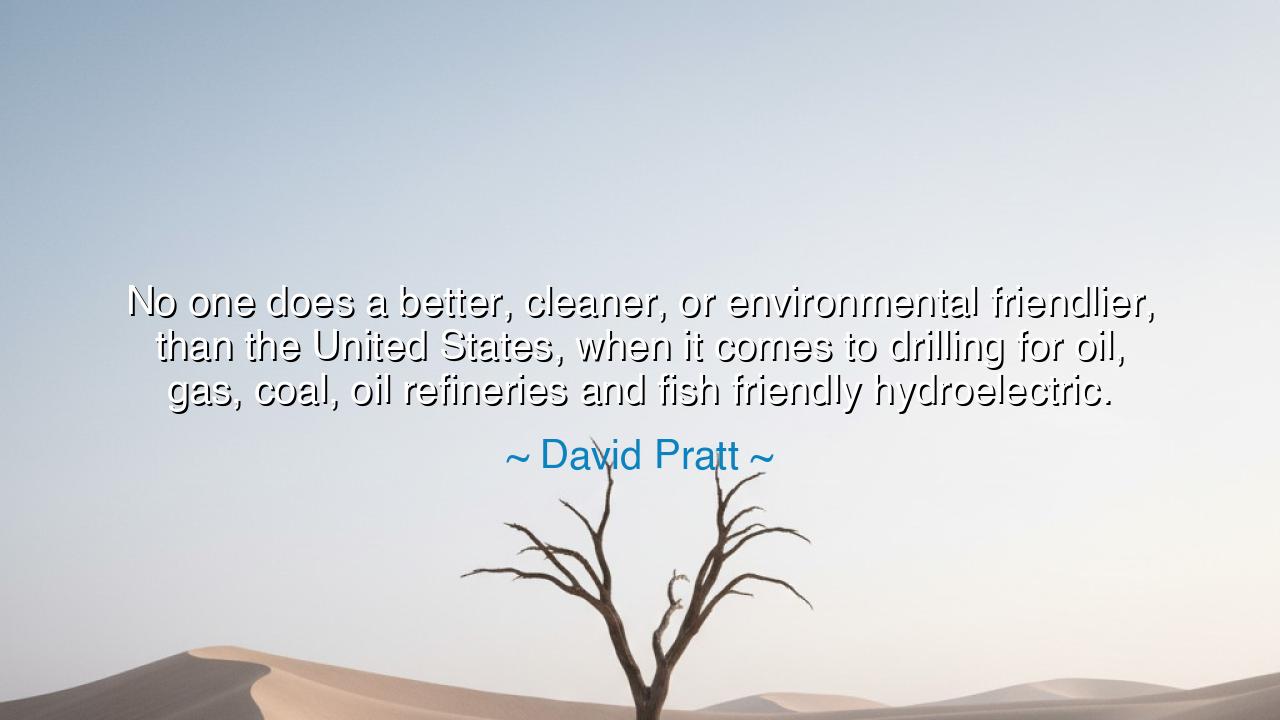
No one does a better, cleaner, or environmental friendlier, than
No one does a better, cleaner, or environmental friendlier, than the United States, when it comes to drilling for oil, gas, coal, oil refineries and fish friendly hydroelectric.






The words of David Pratt, “No one does a better, cleaner, or environmental friendlier, than the United States, when it comes to drilling for oil, gas, coal, oil refineries and fish friendly hydroelectric,” are a proclamation of both pride and paradox. They declare that even in the realm of industries often scorned for their destructiveness—oil, gas, coal, and refineries—there is a way to labor with greater care, a way to temper necessity with responsibility. Pratt speaks not as a dreamer denying the need for energy, but as a realist who insists that if such tasks must be done, they must be done with discipline, with technology, and with an eye toward stewardship. His words ring with the spirit of one who sees progress not in abandonment but in refinement.
The origin of this saying rests in the debates of our modern age, when nations wrestle with the twin burdens of energy and environment. Some cry for an end to fossil fuels altogether; others insist they are the lifeblood of industry. Pratt offers a middle voice: that if these industries endure for now, they must at least be carried out with the greatest possible care. His phrase “fish friendly hydroelectric” is symbolic, evoking not only the power drawn from rivers but the creatures who swim within them, and reminding us that even in progress, the life of the earth must not be forgotten.
History provides us with an example in the story of the Tennessee Valley Authority (TVA). In the 1930s, as America struggled in the Great Depression, great dams were built to generate electricity, control floods, and provide jobs. Yet these same dams also disrupted ecosystems, blocking fish migrations and altering rivers forever. In later decades, however, technology evolved—fish ladders were built, habitats restored, and ecological considerations woven into engineering. Thus, what was once only brute force became tempered with wisdom. Pratt’s words echo this very spirit: that even in industries of power and extraction, cleaner and friendlier methods can emerge when will and science unite.
The deeper meaning of Pratt’s claim is not that the United States is perfect in its practices, but that it aspires to lead by example. He points to the possibility of industry balanced with care, of technology refined to protect as well as to extract. This is not the easy path, for profit urges shortcuts, and greed despises limits. Yet if pursued, it becomes a noble model: that strength need not always wound, that even the mighty engines of oil rigs and refineries can be bound to rules of responsibility. His words remind us that true greatness is not only in production but in restraint.
Yet his saying is also a warning, veiled in pride. For if the United States, with its wealth and science, fails to uphold these standards, then the harm will be magnified, and its boast will become hollow. To do energy “better, cleaner, and environmental friendlier” is not a one-time act but a continual discipline, requiring vigilance, innovation, and humility. Without it, the rivers will still grow foul, the skies will still darken, and the children of tomorrow will inherit scars in place of prosperity. Thus, Pratt’s words carry both triumph and responsibility.
The lesson for us is clear: if we must draw from the earth, let us do so as stewards, not as plunderers. Let us demand that industries follow the strictest standards, that technology be used to heal as much as to harness, and that progress never forget the living world that surrounds it. Let each citizen remember that consumption and extraction are bound together—that the fuel we use, the power we demand, comes from the earth itself. By choosing wisely, by holding leaders and corporations accountable, we become participants in shaping whether industry wounds or preserves.
Therefore, let us act with wisdom and vigilance. Support cleaner technologies, encourage the transition to renewables, but also demand that the industries that remain follow the highest standards of care. Let no river be sacrificed needlessly, no air made foul without restraint, no earth torn open without restoration. For to labor “better, cleaner, and environmental friendlier” is not only the duty of a nation but of all humanity.
So let Pratt’s words be remembered: “No one does a better, cleaner, or environmental friendlier…” Whether one agrees or disputes the claim, the principle remains eternal—that power must be bound to responsibility, and that industry without care is ruin, but industry with discipline can be shaped into stewardship. Let future generations say that in our time, we learned not only to build and extract, but also to honor the earth even as we drew from its depths. For this balance is the true measure of wisdom.






AAdministratorAdministrator
Welcome, honored guests. Please leave a comment, we will respond soon